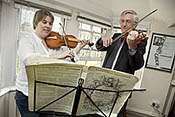Transforming Beethoven performance

(PhysOrg.com) -- Transforming modern orchestral performances of works by Beethoven and his contemporaries by re-aligning players with the lost string techniques of the early 19th century is the focus of a major new Fellowship at the University.
The School of Music has been awarded a prestigious Arts and Humanities Research Council Fellowship in the Creative and Performing Arts to tackle orchestral string playing and increase knowledge and understanding of the performance practices of Beethoven’s time.
To date, scholarly research in the field has shown that so-called ‘period’ performances of 19th-century repertoire often lack historical accuracy and fidelity, and true techniques of the age are widely misrepresented. This Fellowship will directly address those issues by aiming to influence the ways in which players in modern period-instrument orchestras perform the music of Beethoven and his contemporaries.
As a result of the research, for the first time, practice-led resources will be developed that will enable performers to build the skills required to reproduce early 19th-century string style. Patterns of musical style will also be established, offering guidance and conclusions about how modern period string players should approach technical and expressive issues.
The Fellow, Claire Holden, is a leading violinist in the Orchestra of the Age of Enlightenment (OAE), regarded as one of the most outstanding period-instrument ensembles in the world. She has a wealth of orchestral and chamber music experience and has researched violin playing since she was a student at the Royal College of Music. Claire will be mentored by Professor Robin Stowell, an international authority on historically informed string playing who has published pioneering work on performance practices in Beethoven’s era.
Speaking about the importance of the research, Professor Stowell of the School of Music said: “The Fellowship addresses a long-existing void between the performing and scholarly communities. Period-instrument performance is well established and enjoys an increasingly mainstream profile within the classical music industry, but the claim that it is historically informed often does not hold true. Nineteenth century practices have never been fully explored or realised for a number of reasons, including commercial factors, the lack of available training and difficulties in interpreting and realising scholarly material. Whilst several current recordings of Beethoven’s symphonies are well respected, it would be misguided to accept them as definitive examples of historical performance in this repertoire.”
Professor Stowell continued: “The aim of this Fellowship is to transform historical performance by establishing and communicating the information that string players need to understand and assimilate in order to reproduce the techniques that were natural to the performers of Beethoven’s time.”
The project will document and illustrate the physical ways in which lost techniques of the early 19th century can be recreated. The Fellow will examine relevant editions of Beethoven’s orchestral and chamber compositions and provide detailed case studies on Beethoven symphonies for orchestral players and conductors.
Concerts and workshops with the OAE will be held throughout the five-year project to ensure that knowledge transfer from the Fellowship directly affects public performances. Workshops will also be held at the Royal Academy of Music and other leading conservatoires, and pre-concert talks and public lectures will help to expand and enhance the audiences’ understanding and appreciation of 19th century performance.
“Performers, conductors, ensembles, audiences and academics alike will benefit from this Fellowship,” said Professor Stowell. “As well as leading to more faithful performances of the music of Beethoven and his contemporaries, it will also allow the academic community to gain a greater understanding of the problems facing practitioners and to tailor research accordingly in the future.”
The Arts and Humanities Research Council supports world-class research that furthers our understanding of human culture and creativity. The funded research can lead to improvements in social and intellectual capital, community identity, learning skills, technological evolution and the quality of life of the nation.
Provided by Cardiff University

















